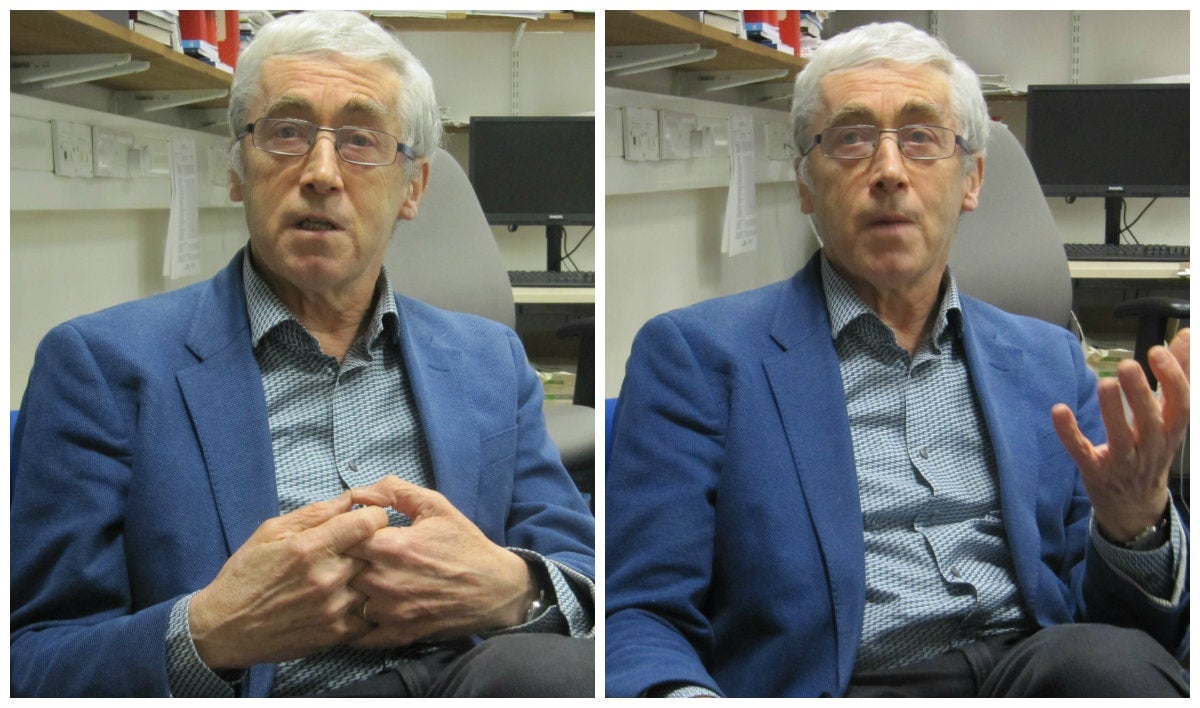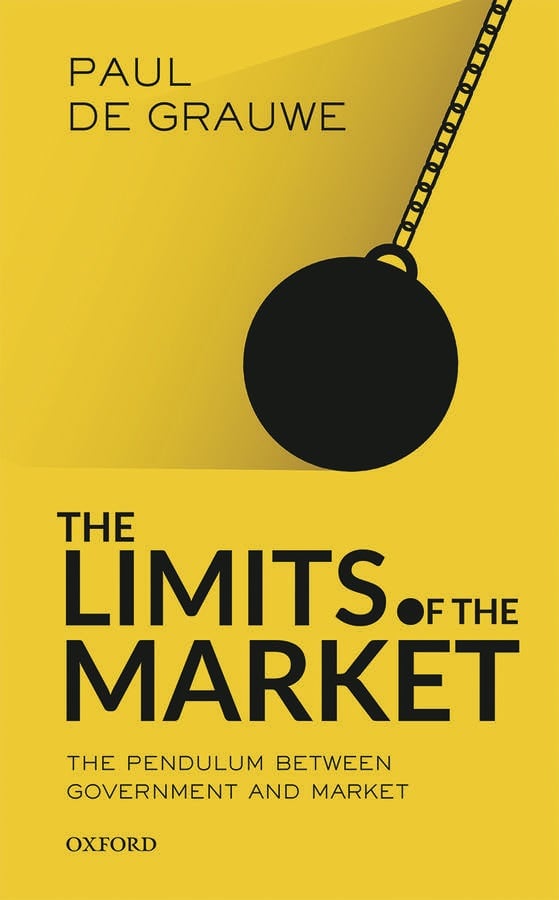Capitalists are destroying capitalism. They must be stopped
For two centuries, there has been a power struggle over which force should drive economies—governments or free markets.


For two centuries, there has been a power struggle over which force should drive economies—governments or free markets.
Although markets reign today, Paul de Grauwe says that the forces of government control are strengthening. De Grauwe is one of Europe’s leading economists, now at the London School of Economics, and his book The Limits of the Markets (Oxford University Press) was recently translated into English from Dutch. In the book, de Grauwe warns that the nature of swings in “the pendulum between government and market” can be dangerously disruptive.
Early in the 19th century, economic liberalization came into fashion, with free-market theories dominating for more than 100 years. Then, the Great Depression in the 1930s pushed power back to governments. People put their faith in large-scale government interventions from Roosevelt’s “New Deal” to the Nazi’s uncompromising economic program. Governments tightened their hold after the Second World War, but as the Soviet Union and other centrally planned states struggled, free marketeers once again held sway in the 1980s.

Faith in free markets was later shaken by the 2008 global financial crisis, and governments are now steadily wresting power back from the markets. This includes leaders once committed to deregulation, like the UK’s Conservative party, which is now promising to cap energy bills, and the US Republican party under Donald Trump, who is hectoring companies into keeping high-cost workers in the US.
De Grauwe spoke with Quartz about the threats to the market system, the environment, the euro and much else besides. The conversation has been edited for length and clarity.
What do you mean when you say that markets have reached their limits?
When markets grow they don’t take care of two things, both of which are external costs. One is the environment. Without government control, the markets will lead to so much destruction of the environment that people will reject it—that’s when the market hits its limit. We can already see it today in the extreme levels of pollution in China and India.
The other external cost has to do with inequality. What do you do with a market system that creates great benefits for many people but also hardship for those in society that lose? We can’t let this happen because it will lead to political instability. We have to be willing to tell the rich, “you will have to contribute more and we will have to tax you more.” Unfortunately, we don’t do that.
You say we heading back to a point where governments take more control. How does that play out?
That’s one of the things that frightens me. When governments return it’s very traumatic because it’s likely to lead to authoritarian systems that destroy much of what we have built up in terms of democracies and the markets. We either get the kind of systems we know, like the communist system, but I don’t see that much on the horizon. Or, we get the crony capitalist system where authoritarian figures use the markets to enrich themselves and you get vast corruption. That’s the big danger but quite inevitable if we are not capable of solving these environmental and inequality problems.
So how do you judge which is better? A government-led system or market-led system?

In the 1980s, I was very much among those who believed that market systems were superior and that governments simply profited from the productivity of markets. But at a certain point I realized these were not appropriate views. We should stop thinking in terms of hierarchies—they are equally important. Markets can’t create value if there are no public goods; if there is no infrastructure, no good educational system. We need governments and public action to do that.
Speaking of public goods, the environment isn’t always central to economic policy discussions. What are the risks our treatment of the planet pose to the market system?
You can already see the impact. Look at what happens with the flow of people between Africa and Europe. In the north of Africa, climate change leads to vast areas becoming totally inhabitable, creating huge hardship. Climate change can also lead to huge political disruption, fighting and dispute over land that could lead to wars and vast movements of people we can’t contain. It’s already starting, but we don’t make the link to the environment.
On the other limit to the market—inequality—you share some ideas and principles with Thomas Piketty on things like a progressive wealth tax.
Like Piketty, I do believe that we can’t allow wealth to become too concentrated, not only for ethical reasons but also for reasons of democratic decision making. In the US, where wealth concentration has become quite excessive, the wealthy have so much power and you can see it in the political system. A president has come to power representing the wealthy and they have their own agenda. They want even more wealth, even more power, and this we cannot accept. It will destroy democracies and, in the end, the market system.
That’s why it is essential to save capitalism—we have to save it from capitalists. Capitalists, who in their drive to accumulate so much wealth, will destroy the market system. In order to maintain the market system you will have to introduce some limit on wealth concentration and this can be done by a progressive wealth tax.
How would it work?
The tariffs you apply increase with the size of the wealth. That’s the principle. Of course, I’m aware that this is going to be very difficult to apply because—as in the case of the environmental control and CO2 emissions—you need international cooperation. If just one country introduces a progressive wealth tax, the rich will move to other countries.
In the Brexit negotiations, the UK has threatened the EU by saying it will cut taxes if it doesn’t get what it wants, essentially turning Britain into a tax haven.
The forces today aren’t going in the right direction. Clearly the wealthy and multinationals know how to exploit the situation and set one government up against the other by threatening to leave. As a result they get their way.
Speaking of Europe, one of the chapters in your book addresses the notion that the euro is fundamentally flawed. Others, like Joseph Stiglitz, come to a similar conclusion. What’s wrong with the euro?
My view is similar to Stiglitz’s view. What I say is that the euro was a beautiful idea but now we are seeing the real implications. One of them is that we have taken away the responsibility of national governments in the euro zone to stabilize their economy and maintain social security systems that will protect people who are hurt by the cyclical movements of capitalism. Meanwhile, we have not been willing to create a European government that will take over that responsibility. It’s eroded the legitimacy of national governments. In the end, we’ll have to either move forward into creating a European government or go back to national governments and national currencies.
The euro wasn’t envisioned as reversible, so there doesn’t seem to be a way to return to national currencies that won’t be incredibly disruptive.
It could really lead to the destruction of the EU. Today, the euro isn’t that popular and in many countries people say they have had enough of Europe. But in a way I think we are condemned to go forward.
You were a member of the Belgian parliament when the euro was being created. (De Grauwe was a member of both houses of parliament between 1991 and 2003. The euro was introduced in 1999.)
I was one of the European economists that was skeptical right from the start. I published an article in 1998 (pdf)—which was also the time of the financial crisis in Asia and in Russia—where I asked if this could also happen in the euro zone that we are going to create? Yes, of course, it could happen. In fact, this is even more likely to happen in a monetary union because all this capital can flow very freely within it. I was saying we are starting something that is a high-risk adventure and we haven’t created the institutions to deal with it. And, in fact, the crisis I described happened.
Do you think capitalism is more under threat in Europe than elsewhere because of the euro?
Yes, because we have created in the euro zone free movement of capital that is quite disruptive when there is a crisis. Each time there is going to be a recession—which will happen again—we will see capital fleeing one country, rushing to another and destabilizing the whole system. We cannot afford this happening again.